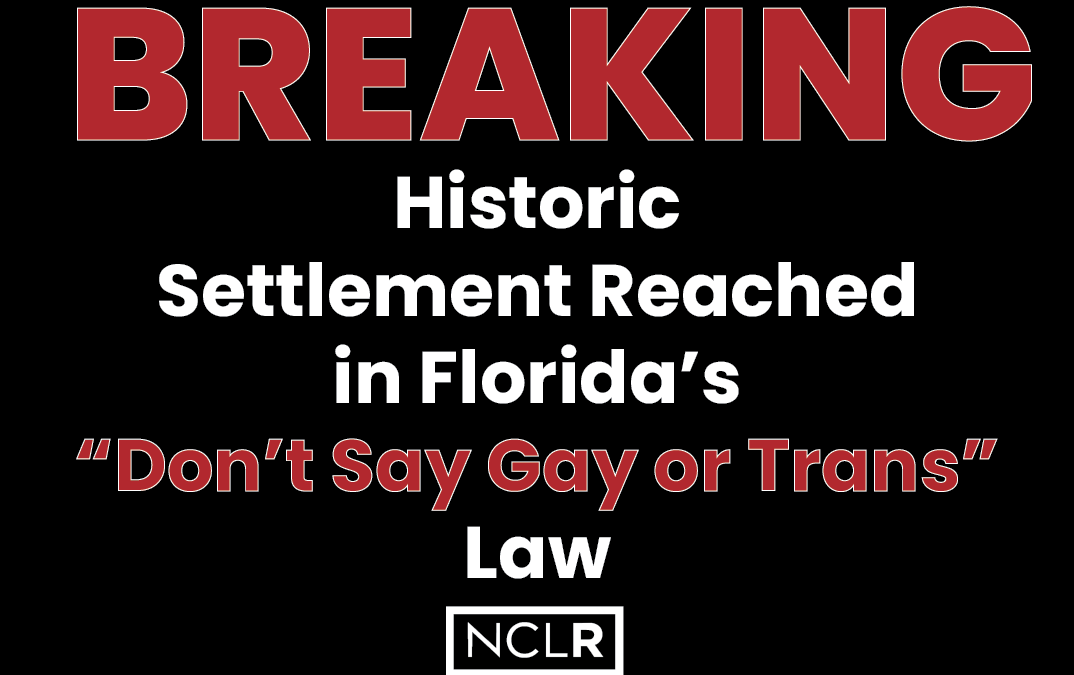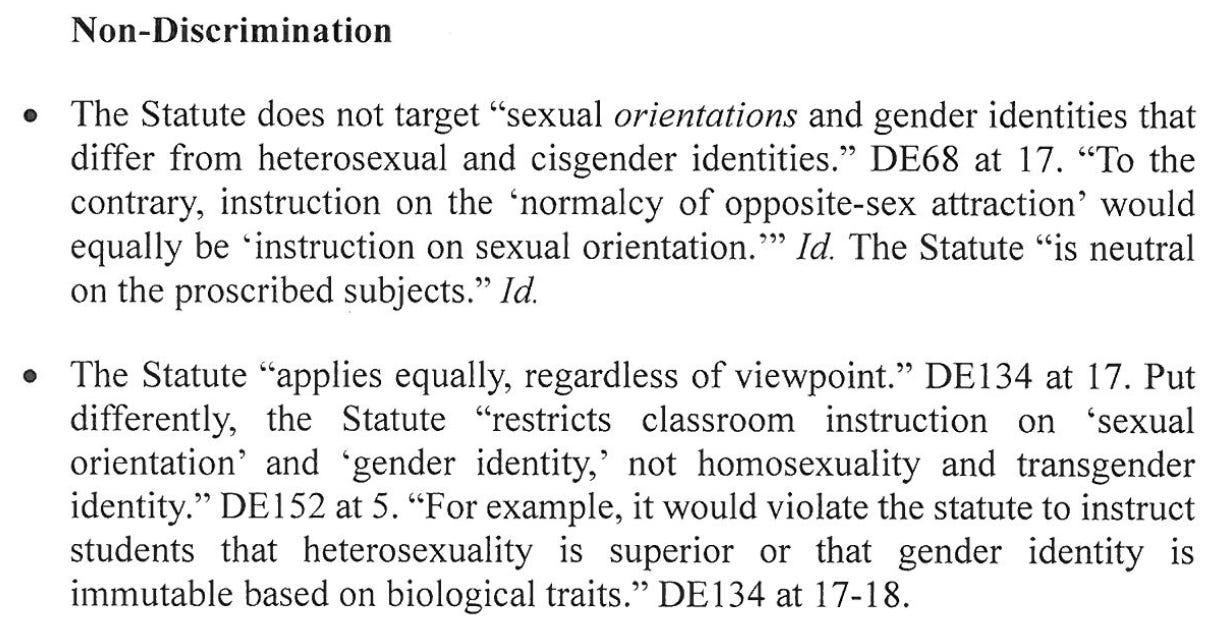Florida news, from Cannon rejecting a Trump request to the "Say Gay" settlement
Judge Cannon denied Trump's request to toss out Espionage Act case against him, and DeSantis settles the challenge to Florida's "Don't Say Gay" law.
Donald Trump’s aim is to continue pushing off final resolution of his criminal and civil disputes, win re-election, drop the federal prosecutions against him, and have his — and he views it as his, we know — Justice Department defend against him facing any state prosecutions while president.
In light of that, it matters that Trump faced his first loss from U.S. District Judge Aileen Cannon in that effort on Thursday — as incomplete and partial as it was. Following a hearing over two of the several motions Trump has filed seeking to have the classified documents case in Florida dismissed, Cannon denied Trump’s request to “find [Section 793(e) of the Espionage Act] void for vagueness under the circumstances of this case.”
She denied the request “without prejudice,” however, meaning he can raise it — or aspects of it — later in the prosecution. Specifically, she noted that the request “raises various arguments warranting serious consideration,” but concluded — after a bit of her own vague language — that she would “deny the Motion without prejudice, to be raised as appropriate in connection with jury-instruction briefing and/or other appropriate motions.”
The mention of “jury-instruction briefing” is notable, given the requests to dismiss the case that remain outstanding. While it certainly doesn’t preclude her from granting one of them, or from dismissing some of the charges, the language does suggest that she is, at the least, seriously preparing for the case to go to trial.
Trump, of course, also faces federal charges related to Jan. 6 in D.C. — a case on hold while his presidential immunity claim is considered at the U.S. Supreme Court. Additionally, Trump faces state criminal charges related to Jan. 6 in Georgia and related to alleged hush money payments in New York — where he is also appealing the $454 million civil fraud judgment against him and his company. Finally, he also is appealing the $83 million verdict E. Jean Carroll obtained against him in her defamation case.
Despite all of that, on March 12, Trump secured enough delegates to be the Republican Party’s presumptive presidential nominee.
Settling
A statement from Florida Gov. Ron DeSantis’s office earlier this week declared that he had secured “a major win” against the “activists” who “turned to the courts to stop the legislatively enacted will of the people” in their challenge to what quickly became known as the “Don’t Say Gay” bill — technically, the Parental Rights in Education Act.
Under the settlement agreed to by the challengers and the state, it is true that the limits on classroom instruction regarding sexual orientation and gender identity will remain in effect in Florida. But, with the agreement, they have been pared back to the most narrow interpretation possible.
Most importantly, the limits have also been explicitly defined to prevent discriminatory application or enforcement.
Additionally, every school board across the state will be informed of this settlement and that the contents of it are the state’s understanding of the “meaning of the statute” now and going forward:
Those are significant steps, and there are other important protections regarding student groups and libraries written into the settlement as well. What remains is still troubling and dangerous, but the settlement does much now to defang a law that otherwise was likely to remain in effect with ambiguously broad interpretations — as Popular Information has covered in detail — for the foreseeable future.
While DeSantis’s statement claimed that the challengers’ “judicial activism has failed,” lawyers for the plaintiffs who challenged the law also issued a statement. In their release, they announced the other side — that the settlement “will safeguard LGBTQ+ students from bullying, end censorship of LGBTQ+ communities, and reinstate Gay-Straight Alliances in public schools.”
The settlement itself has not been filed with the court yet, but an executed copy has circulated and was provided to Law Dork. Among the notable provisions are two agreeing that the law is to be applied in a non-discriminatory fashion:
It also narrowly defines “classroom instruction” and the “third parties” to whom the restrictions apply. With this understanding of “classroom instruction” then …
… the state has agreed that many of the specific concerns about interpretation of the law are not correct:
As to “third parties” subject to the law, moreover, the settlement makes clear that only “agents of the public school system” count:
Roberta Kaplan, the lead counsel for the plaintiffs and partner at Kaplan Hecker & Fink LLP, explained the bottom line in the statement:
“Simply put, the State of Florida has now made it clear that LGBTQ+ kids, parents, and teachers in Florida can, in fact, say that they are gay. We cannot overemphasize our gratitude for the courage of our clients — the nineteen plaintiffs who stood up against prejudice and hate, even within their own local communities.”
After the lawsuit was filed, Florida expanded the reach of the law to eighth grade and added another provision regarding treatment of “such instruction” for grades nine through twelve.
Although the settlement does not address that expansion, the state’s commitment to definitions of the terms in the statute — like “classroom instruction” and “third parties” — and the non-discrimination principles would apply to the law as amended, given that the relevant terms did not change with the expansion.
A final word
R.I.P., David Mixner. He was already a given force in national politics by time I came out, as he remained throughout my decades involved in LGBTQ causes and coverage since then. We were never close, but I always was sure to say hi when I saw him and my heart goes out to his many loved ones — in New York City and across the country (and, doubtless, world).







![The Statute "thus restricts instruction on particular subjects (sexual orientation and gender identity), not mere discussion of them." Id. at 18. Consistent with that view, the Legislature rejected a restriction on *encourag[ing] classroom instruction about' the prescribed subjects ni favor of a limited restriction on "classroom instruction."' Id. at 18-19. • "[T]ypical class participation and schoolwork are not 'instruction,' even fi a student chooses to address sexual orientation or gender identity." Id. at 20. The Statute "thus restricts instruction on particular subjects (sexual orientation and gender identity), not mere discussion of them." Id. at 18. Consistent with that view, the Legislature rejected a restriction on *encourag[ing] classroom instruction about' the prescribed subjects ni favor of a limited restriction on "classroom instruction."' Id. at 18-19. • "[T]ypical class participation and schoolwork are not 'instruction,' even fi a student chooses to address sexual orientation or gender identity." Id. at 20.](https://substackcdn.com/image/fetch/$s_!xVwF!,w_1456,c_limit,f_auto,q_auto:good,fl_progressive:steep/https%3A%2F%2Fsubstack-post-media.s3.amazonaws.com%2Fpublic%2Fimages%2F4790d3dd-642f-48c4-8308-be71c24b3257_1216x462.png)
!["Third Parties" • The Statute's reference to "third parties" in addition to "school personnel" simply means that "schools cannot evade the [Statute's] limits by delegating "classroom instruction' on the prescribed topics ot an individual otherthan ateacher, be ti aparent, student, guest lecturer, or anyone else." DE68 at 20. The Statute restricts classroom instruction by "school personnel" as well as "third parties," but only third parties "to whom the school has delegated responsibility for such teaching i.e., agents of the public school system, not parents or students acting in the ordinary course." DE134 at 18. "Third Parties" • The Statute's reference to "third parties" in addition to "school personnel" simply means that "schools cannot evade the [Statute's] limits by delegating "classroom instruction' on the prescribed topics ot an individual otherthan ateacher, be ti aparent, student, guest lecturer, or anyone else." DE68 at 20. The Statute restricts classroom instruction by "school personnel" as well as "third parties," but only third parties "to whom the school has delegated responsibility for such teaching i.e., agents of the public school system, not parents or students acting in the ordinary course." DE134 at 18.](https://substackcdn.com/image/fetch/$s_!Z4JA!,w_1456,c_limit,f_auto,q_auto:good,fl_progressive:steep/https%3A%2F%2Fsubstack-post-media.s3.amazonaws.com%2Fpublic%2Fimages%2F376ceaa9-bce1-42f4-a60a-e34f4a8ff4b7_1232x588.png)

David Mixner will, indeed, be missed.
Congratulations Florida activists. This shows that even without winning a suit at the bitter end, much can be accomplished by trying.